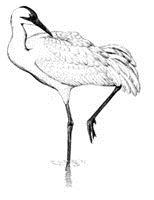North American Crane Working Group

Proceedings of the North American Crane Workshop
Date of this Version
2016
Document Type
Article
Citation
PROCEEDINGS OF THE NORTH AMERICAN CRANE WORKSHOP 13:107-110
Abstract
Capture techniques that lessen handling stress may also lessen pathologic influences on physiologic measures, improving the validity of these measures for use in individual health assessment of freeranging wildlife. Since 1990, the International Crane Foundation (ICF) has successfully used chemical immobilization with alpha-chloralose (AC; C6H11Cl3O6), a chloral derivative of glucose, to facilitate captures of sandhill cranes (Grus canadensis tabida) for ecological studies (Hayes et al. 2003). Although this chemical has been used orally for the immobilization of many species, the physiologic effects of AC are not well understood in cranes. The primary purpose of this study was to measure serum chemistry, venous blood gas, and physiological values in free-ranging sandhill cranes successfully immobilized using this technique.
Included in
Behavior and Ethology Commons, Biodiversity Commons, Ornithology Commons, Population Biology Commons, Terrestrial and Aquatic Ecology Commons


Comments
Copyright © 2016 North American Crane Working Group. Used by permission.
Proceedings may include articles not presented at Workshop.